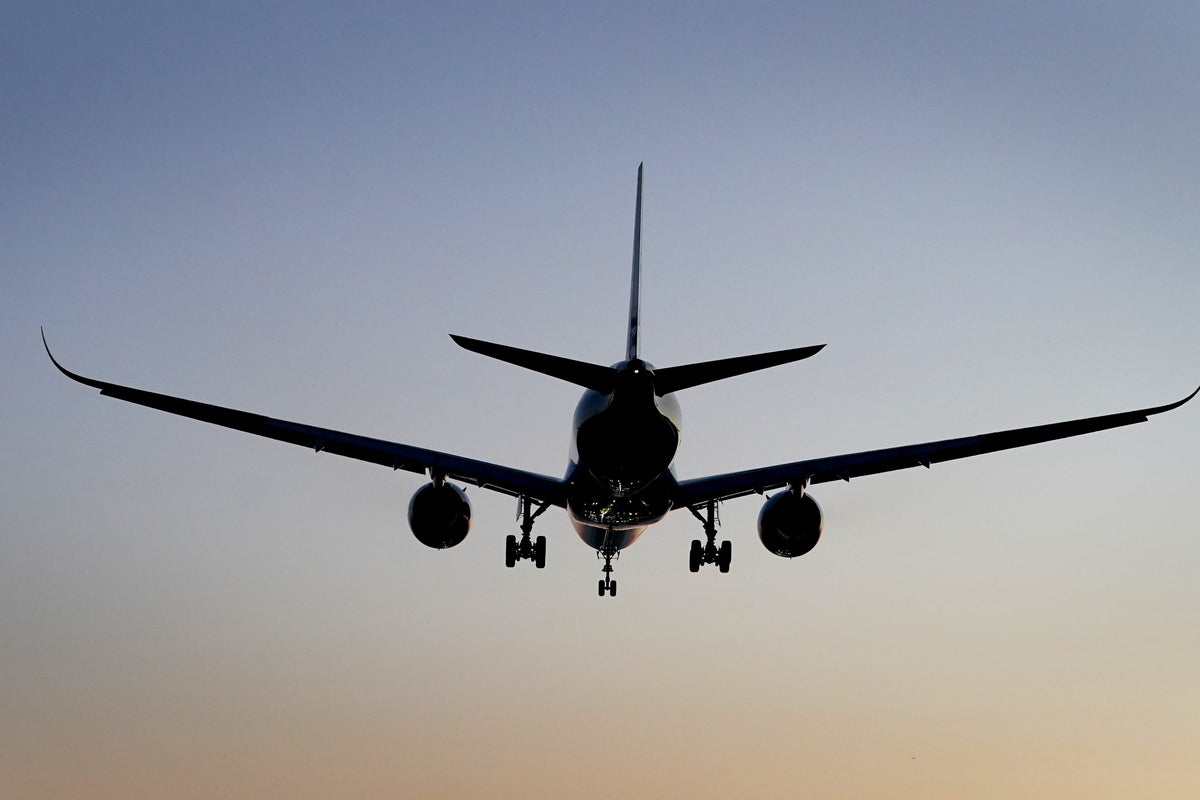Business
Gatwick second runway plan given go-ahead by Government

Gatwick Airport’s £2.2 billion second runway plan has been given the go-ahead by Transport Secretary Heidi Alexander.
In the privately-financed project, the West Sussex airport will move its emergency runway 12 metres north, enabling it to be used for departures of narrow-bodied planes such as Airbus A320s and Boeing 737s.
This will enable it to be used for about 100,000 more flights a year.
Ms Alexander backed the scheme as a “no-brainer” for economic growth, a Government source said, suggesting flights could take off from the new full runway before 2029.
The Cabinet minister is satisfied with adjustments made, covering issues such as noise mitigation and the proportion of passengers who would travel to and from the airport by public transport.
It comes after the Planning Inspectorate initially rejected the airport’s application and earlier this year recommended Ms Alexander should approve the project if the changes were made.
New commitments include Gatwick’s management setting its own targets for the proportion of passengers who travel to the airport by public transport, rather than a legally binding target.
Residents affected by more noise will be able to ask Gatwick to cover the costs for triple-glazed windows.
Homeowners living directly beneath the new flight routes who choose to sell could have their stamp duty and reasonable moving costs paid, as well as estate agent fees of up to 1% of the purchase price.
Gatwick says its plans will create £1 billion per year in economic benefits, and generate an additional 14,000 jobs.
A Government source told the PA news agency: “The Transport Secretary has cleared Gatwick expansion for take-off.
“With capacity constraints holding back business, trade and tourism, this is a no-brainer for growth.
“This Government has taken unprecedented steps to get this done, navigating a needlessly complex planning system, which our reforms will simplify in future.
“It is possible that planes could be taking off from a new full runway at Gatwick before the next general election.
“Any airport expansion must be delivered in line with our legally binding climate change commitments and meet strict environmental requirements.”
Local campaigners opposed to expansion are concerned about the impact on surface transport, noise, housing provision and wastewater treatment, but the airport insists it has conducted “full and thorough assessments” of those issues.
CAGNE, an umbrella aviation community and environment group for Sussex, Surrey and Kent, said it stands ready to serve a judicial review funded by residents and environmental bodies.
The group said: “We know this Government cares little for the environmental impact aviation is having on our planet and Gatwick’s neighbours, but not to demand that Gatwick pays for the infrastructure, the onsite wastewater treatment plant, and noise impact is unlawful in our book.”
The Labour Government’s backing of a third runway at Heathrow Airport in its bid to grow the economy has also drawn criticism from environmental groups and opposition politicians.
Green Party leader Zack Polanski described ministers’ support of a second Gatwick runway as a “disaster”.
He said in a statement: “It ignores basic climate science and risks undermining efforts to tackle the climate crisis.
“Labour keeps wheeling out the same nonsense about growth, but at what cost? What this really means is more pollution, more noise for local communities, and no real economic benefit.”
Stewart Wingate, Vinci Airports managing director for the UK and former Gatwick chief executive, said: “After a lengthy and rigorous planning process, we welcome the Government’s approval of plans to bring our Northern Runway into routine use, ahead of the expected deadline.
“This is another important gateway in the planning process for this £2.2bn investment, which is fully funded by our shareholders and will unlock significant growth, tourism and trade benefits for London Gatwick and the UK and create thousands of jobs.
“As we’ve said previously, it is essential that any planning conditions enable us to realise the full benefits of the project and do not impose unnecessary constraints that make it uneconomic to invest in.
“We now need to carefully examine the details of the planning consent. Once we have done that, we will be able to comment further.”
Business
Video: How ICE Is Pushing Tech Companies to Identify Protesters

new video loaded: How ICE Is Pushing Tech Companies to Identify Protesters
By Sheera Frenkel, Christina Thornell, Valentina Caval, Thomas Vollkommer, Jon Hazell and June Kim
February 14, 2026
Business
52 reforms in 52 weeks: Ashwini Vaishnaw outlines massive railway overhaul for 2026

Indian Railways has reached a global milestone in freight operations, securing its position as a premier international logistics hub. Union Minister for Railways, Ashwini Vaishnaw, announced today that the national carrier has achieved an unprecedented scale in its logistics division. Highlighting this achievement, the Minister stated, “Indian Railways has become the second-largest cargo carrier in the world.”
Building on this momentum, the Ministry has prepared a rigorous roadmap for the upcoming year aimed at systemic transformation. The government plans to roll out a series of weekly initiatives to modernise every facet of rail travel and transport. Vaishnaw explained the structured timeline, saying, “For 2026, Railways has resolved to implement 52 reforms in 52 weeks.”
The initial phase of this plan will prioritise the passenger experience, with a focus on improving the quality of onboard facilities. The Minister identified the primary starting point for this year-long agenda, noting, “The first reform is better onboard services in Railways.”
In addition to passenger amenities, the government is placing strong emphasis on the “Gati Shakti” initiative to streamline the nationwide movement of goods. This strategic focus is designed to strengthen the country’s supply chain. Vaishnaw confirmed the freight sector’s priority, adding, “The second concerns ‘Gati Shakti Cargo.’”
A cornerstone of the 2026 agenda is a comprehensive overhaul of sanitation and hygiene standards. The Ministry has developed a new blueprint to ensure that the rail network’s cleanliness meets global benchmarks. Detailing the specifics of the first major initiative, the Minister remarked, “Reform number one for 2026 will ensure proper end-to-end cleaning of the Railways… The concept of a clean rail station has been established.”
This cleanliness drive is not a short-term measure but a multi-year commitment to cover the entire Indian Railways fleet. The implementation will be phased to ensure thoroughness and consistency. Vaishnaw clarified the timeline, stating, “Over three years, this reform will be implemented across all trains.”
To ensure the success of these reforms, the Ministry is introducing a robust accountability framework. These measures will include performance-based contracts and the integration of modern digital tools to monitor progress in real time. Emphasising the shift towards professional and technology-driven management, the Minister concluded, “There will be clearly defined service-level agreements… There will be extensive use of technology.”
Business
BrewDog owners say craft beer company could be sold off

Craft beer brand BrewDog could be sold off after the company started the process to find new investors.
The Scottish beer brand recently announced plans to close all of its distilling brands, meaning it would no longer produce any of its spirits, including Duo Rum, Abstrakt Vodka, and Lonewolf Gin, at its distillery in Ellon, Aberdeenshire.
The company, which was founded in 2007, said it made the decision to focus on its beer brands, including the highly-popular Punk IPA, Elvis Juice, and Hazy Jane.
Now, in a statement, a spokesperson for BrewDog said the company had appointed Alix Partners to “support a structured and competitive process to evaluate the next phase of investment for the business.”
The statement said: “As with many businesses operating in a challenging economic climate and facing sustained macro headwinds, we regularly review our options with a focus on the long-term strength and sustainability of the company.
“Following a year of decisive action in 2025, which saw a focus on costs and operating efficiencies, we have appointed AlixPartners to support a structured and competitive process to evaluate the next phase of investment for the business. This is a deliberate and disciplined step with a focus on strengthening the long-term future of the BrewDog brand and its operations.”
Although no decisions have been made, a sale is under consideration.
In a statment BrewDog added: “BrewDog remains a global pioneer in craft beer: a world-class consumer brand, the No.1 independent brewer in the UK, and with a highly engaged global community. We believe that this combination will attract substantial interest, though no final decisions have been made.”
According to reports by Sky News, AlixPartners had begun sounding out prospective buyers in the last few days.
The company, which has 72 bars worldwide and four breweries in Scotland, the US, Australia, and Germany, said its breweries, bars, and venues will continue to operate as normal. It employs 1400 people across the organisation.
BrewDog’s founders James Watt and Martin Dickie are the company’s major shareholders alongside private equity company TSG, which invested £213 million in 2017, making it a 21 per cent shareholder.
In 2024, the beer brand grossed £357 million in sales, and it is a major independent brewer with 4 per cent market share in the UK grocery market.
-

 Entertainment1 week ago
Entertainment1 week agoHow a factory error in China created a viral “crying horse” Lunar New Year trend
-

 Business4 days ago
Business4 days agoAye Finance IPO Day 2: GMP Remains Zero; Apply Or Not? Check Price, GMP, Financials, Recommendations
-

 Tech1 week ago
Tech1 week agoNew York Is the Latest State to Consider a Data Center Pause
-

 Tech1 week ago
Tech1 week agoNordProtect Makes ID Theft Protection a Little Easier—if You Trust That It Works
-

 Tech1 week ago
Tech1 week agoPrivate LTE/5G networks reached 6,500 deployments in 2025 | Computer Weekly
-

 Fashion4 days ago
Fashion4 days agoComment: Tariffs, capacity and timing reshape sourcing decisions
-

 Business1 week ago
Business1 week agoStock market today: Here are the top gainers and losers on NSE, BSE on February 6 – check list – The Times of India
-

 Business1 week ago
Business1 week agoMandelson’s lobbying firm cuts all ties with disgraced peer amid Epstein fallout






